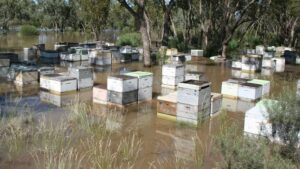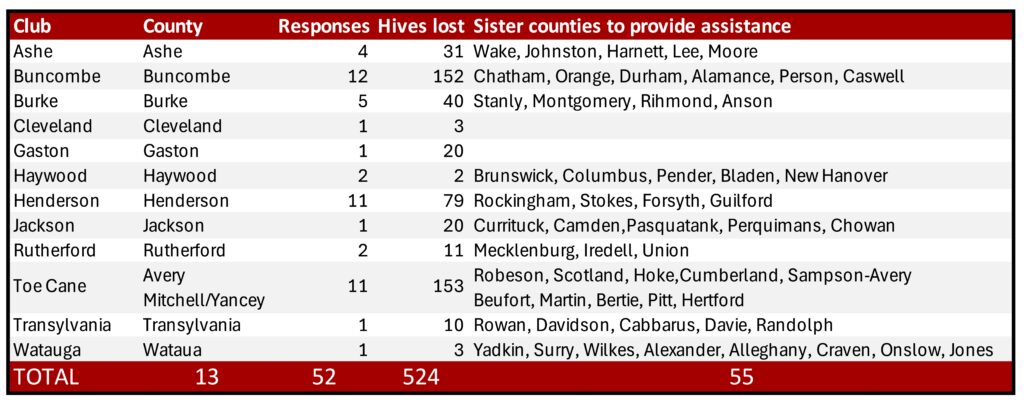Disaster Recovery for Beekeepers in WNC
go.ncsu.edu/readext?1032295
en Español / em Português
El inglés es el idioma de control de esta página. En la medida en que haya algún conflicto entre la traducción al inglés y la traducción, el inglés prevalece.
Al hacer clic en el enlace de traducción se activa un servicio de traducción gratuito para convertir la página al español. Al igual que con cualquier traducción por Internet, la conversión no es sensible al contexto y puede que no traduzca el texto en su significado original. NC State Extension no garantiza la exactitud del texto traducido. Por favor, tenga en cuenta que algunas aplicaciones y/o servicios pueden no funcionar como se espera cuando se traducen.
Português
Inglês é o idioma de controle desta página. Na medida que haja algum conflito entre o texto original em Inglês e a tradução, o Inglês prevalece.
Ao clicar no link de tradução, um serviço gratuito de tradução será ativado para converter a página para o Português. Como em qualquer tradução pela internet, a conversão não é sensivel ao contexto e pode não ocorrer a tradução para o significado orginal. O serviço de Extensão da Carolina do Norte (NC State Extension) não garante a exatidão do texto traduzido. Por favor, observe que algumas funções ou serviços podem não funcionar como esperado após a tradução.
English
English is the controlling language of this page. To the extent there is any conflict between the English text and the translation, English controls.
Clicking on the translation link activates a free translation service to convert the page to Spanish. As with any Internet translation, the conversion is not context-sensitive and may not translate the text to its original meaning. NC State Extension does not guarantee the accuracy of the translated text. Please note that some applications and/or services may not function as expected when translated.
Collapse ▲Update 11/02/24
We are tabulating a running compilation of the documented needs of beekeepers in Helene-affected areas. This table will be updated as more information is acquired. To add information, please fill out the gForms below, email us at ncsu.apiculture@gmail.com, or call us at 919-513-3967.
******
Update 10/15/24
Working with the Greater Good Charities, arrangements have been made for Hoopers Creek Bee Supply (Arden, NC 28704) to receive 6 pallets of crystalized sugar. Sugar can be mixed with water to provide supplemental feed for honey bee colonies so that they can store sufficient honey to survive the winter, but it stores more readily than pre-mixed sugar syrup. One can also make a sugar or “candy board” for colonies in need of feed when temperatures are too low to process liquid syrup.
Many thanks to the NCSBA, Hoopers Creek Bee Supply, and Bryna Donnelly of Greater Good for coordinating this helpful resource for beekeepers in WNC, as well as Mann Lake Beekeeping Supply for providing the load of sugar. All those who may benefit from this supply of sugar can coordinate directly with Hoopers Creek (828-676-0989).
******
As a beekeeping community, we are all saddened by the devastation in Western North Carolina and adjacent states. Clearly the immediate focus needs to remain on shelter, potable water, power, fuel, and infrastructure to help with the ongoing humanitarian efforts. Our sincerest thanks go out to all who have been tirelessly doing so, and please continue to donate your resources and time to help in the recovery efforts.
Information is still coming in, and we do not have a complete picture about the population of managed honey bees in the region. Anecdotally, some beekeepers and their hives were left unscathed, others have been completely wiped out, with who knows how many in between. There are some immediate efforts currently underway, such as the Greater Good Charities honey bee project to provide sugar syrup for starving bees (since much of the forage in the region has been stripped away), so if you have such an immediate need or wish to make a donation please so.
 In the more intermediate term, however, we do not want to have beekeepers and their colonies in the affected areas fall through the cracks. In the greater efforts concerning livestock or local agriculture, so often the focus is on more prominent sectors other than beekeeping. It is also clear that this recovery is going to take a protracted period to fully restore the environment and infrastructure in the region. With that in mind, we propose an initiative to provide nucleus colonies and hive equipment to affected beekeepers starting next spring when new colonies are typically established. This is not something that can be done overnight, and it will take substantial coordination among beekeepers, the NCSBA and its local chapters, the NCDA&CS Apiary Inspection Service, and the N.C. Cooperative Extension Service, so we look forward to developing a logistical structure to disseminate bees and hives to those who have lost them from flood damage. Our program will be seeking some external funding for responding to extreme weather events, so hopefully we may also be able to bring to bear some external inputs.
In the more intermediate term, however, we do not want to have beekeepers and their colonies in the affected areas fall through the cracks. In the greater efforts concerning livestock or local agriculture, so often the focus is on more prominent sectors other than beekeeping. It is also clear that this recovery is going to take a protracted period to fully restore the environment and infrastructure in the region. With that in mind, we propose an initiative to provide nucleus colonies and hive equipment to affected beekeepers starting next spring when new colonies are typically established. This is not something that can be done overnight, and it will take substantial coordination among beekeepers, the NCSBA and its local chapters, the NCDA&CS Apiary Inspection Service, and the N.C. Cooperative Extension Service, so we look forward to developing a logistical structure to disseminate bees and hives to those who have lost them from flood damage. Our program will be seeking some external funding for responding to extreme weather events, so hopefully we may also be able to bring to bear some external inputs.
Please fill out these online forms so that we start to solicit information from both beekeepers in affected areas (those with need) as well as beekeepers in unaffected areas (those who are willing to help):
Beekeepers needing assistance from Helene
NCSBA members in WNC needing assistance
Beekeepers willing to provide assistance to beekeepers in WNC
In the meantime, help us spread the word about plans to assist the beekeeping community in WNC. Please also share these important links with further information for beekeepers in your area:
NC State Extension Disaster Information Center
Hay and Livestock Assistance Form (NCDA&CS)
USDA Emergency Assistance for Livestock, Honey Bees, and Farm-raised Fish (ELAP)



